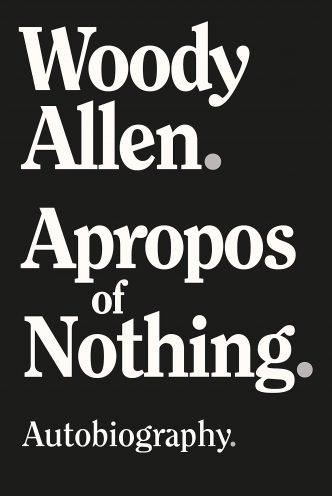 By WOODY ALLEN (Arcade Publishing; 2020)
By WOODY ALLEN (Arcade Publishing; 2020)
It’s an interesting thing about Woody Allen: not too long ago he was considered the epitome of class and sophistication, but now he’s a pariah. To gauge just how far his fortunes have fallen just take a look at the publishing history of this memoir, which was initially set to be put out by Grand Central Publishing, who dropped it after an outcry; it was subsequently acquired by Arcade Publishing, and published it with very little in the way of publicity. Not that it mattered, as the book essentially publicized itself (I know I had little interest in reading it until learning I couldn’t).
The reason for all the strife, for the two or three of you who don’t already know, are longstanding allegations of child rape made against Allen by his ex-girlfriend Mia Farrow, and also the fact that he hooked up with Farrow’s adopted daughter Soon-Yi Previn under questionable circumstances. In APROPOS OF NOTHING Allen defends himself in an extremely heavy-handed and self-pitying final section, which renders an otherwise witty and light-hearted book rather lopsided.
I’ll confess I’m not entirely swayed by Allen’s passionate proclamations that he’s been falsely accused, although I was never convinced by Mia Farrow’s claims (contained in the 1997 book WHAT FALLS AWAY) either. As the late film editor Sam O’Steen said about Farrow, “on the one hand you see how she manipulates people with that child/waif act, but on the other hand she believes it.” Allen appears to suffer from a similar confusion between his public and private selves.
The Woody Allen unveiled in these pages is very much in keeping with the lovable schlemiel persona he’s cultivated over the decades. If Allen’s self-deprecating recollections are to be believed, his success was due mostly to luck, circumstance and a writing talent that he himself doesn’t entirely understand, as his grades were poor and his early reading consisted mostly of comic books and Mickey Spillane novels. Allen writes of his relationships with Louise Lasser and Diane Keaton, and his early years honing his standup comedy act, in a determinedly unimpressed tone: “Folks, you are reading the autobiography of a misanthropic gangster-loving illiterate; an uncultivated loner who sat in front of a three-way mirror practicing with a deck of cards.” People who know Allen have described a far more calculating and self-aware (and litigious) individual, but anyway…
Of the films for which he’s become famous, Allen is similarly deprecating: “while some are entertaining, no idea I ever had is going to start any new religion.” Actually, Allen came very close to doing just that, with films like MANHATTAN, HANNAH AND HER SISTERS and CRIMES AND MISDEMEANORS proclaimed epoch-defining masterpieces by the literati, although in describing them Allen, as is his custom, keeps his spirits in check and his sense of humor honed, claiming of MANHATTAN that “Anything with so much praise has a hard time living up to the hype, and to me MANHATTAN fell far short,” and of CRIMES that it “caused slumber.”
Thus it’s all the more jarring when the tone changes in the final hundred or so pages, in which things turn very serious indeed. The problems began with the Allen-Soon-Yi love affair, which included what seems a most uncharacteristic act: the leaving of X-rated Polaroid pics of these lovebirds in plain sight of Soon-Yi’s mother. Allen’s explanation is simple short-sightedness, or “simply a blunder by a klutz. Sometimes, a cigar is just a blunder by a klutz.” Other things we learn in this book include Allen’s thoughts on modern-day comedy (unsurprisingly, he thinks today’s comedians are too dirty), his affection for much younger women (in addition to Soon-Yi, to whom the book is dedicated, he writes passionately of Scarlett Johansson, Emma Stone, Mariel Hemingway and HALLOWEEN III actress Stacey Nelkin, the latter two of whom he bedded when they were teenagers). Of his legendary sexual appetite, alas, we learn very little (he’s partial to the term “make love”), nor the particulars of his relationships with Bill Cosby and Harvey Weinstein, who are both mentioned here, but only briefly. This book may tell the story of Woody Allen, but it doesn’t tell the whole story by any means.
